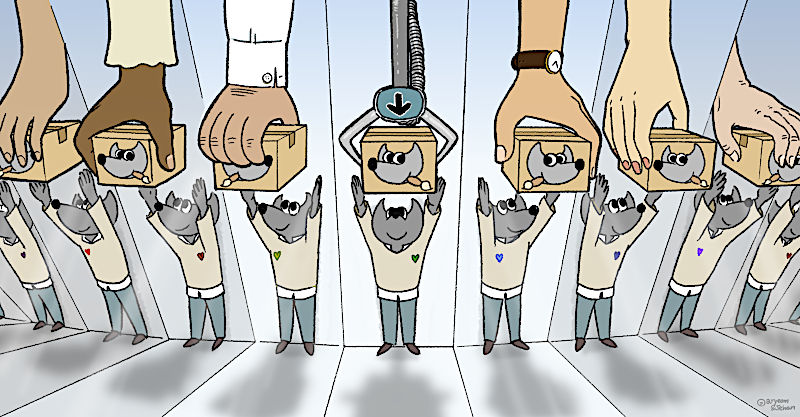As far as we could remember, organizations from all over the world have supported the GNU Image Manipulation Program by mirroring 🪞 our file downloads. This is important as we may have to sustain dozens of thousands downloads a day.

Official mirrors (to publication day)¶
The current list of official mirrors by alphabetical order:
- Aalborg University
- Academic Computer Club, Umeå University
- Artfiles New Media GmbH
- Astra ISP
- CSC - IT Center for Science / FUNET
- Cu.be Solutions
- Dmitry Shishkin
- dogado GmbH
- eScience Center, Nanjing University
- Friedrich-Alexander-Universität Erlangen-Nürnberg (FAU)
- Göttingen University and Max Planck Society
- Interdisciplinary Centre for Mathematical and Computational Modelling UW, University of Warsaw
- IP-Connect LLC
- Korea FreeBSD Users Group
- Jaleco
- Kumi Systems
- Lysator ACS
- nbshare.io
- Studenten Net Twente (SNT), the University of Twente
- UKFast
- University of Crete
- University of Kent UK Mirror Service
- University of Maryland, College Park
- XMission
One more mirror request is being processed at the moment.
The always-updated list is on a dedicated sponsor page. The image above poetically representating the mirrors, by Aryeom of ZeMarmot project, will also illustrate this sponsor page.
💌 Thanks to all these organizations!
What are official mirrors?¶
We recently cleaned out our mirror list per these rules:
- We now list exactly the mirrors verified by the infrastructure team, no more no less. Being verified gives you rsync credentials allowing faster and safer updates. See below if you want in.
- Mirrors are not listed anymore in the Downloads page since there is an automatic mirror rotation operating when clicking the download buttons. Instead we have the dedicated Sponsors page, which means better visibility to sponsoring mirrors, all the while simplifying the download page which used to be over-crowded with information.
- We display names of mirroring organization, for instance “University of XYZ” with a link to the organization website, rather than just URLs.
Note: we had more mirrors either listed on our former download page or who made reports of interest to be official mirrors across the years (back then our workflow was much fuzzier). We sent messages to all of them but are not sure it reached the people in charge. If you wish to be part of the official list, help shoulder the download burden and be featured on our sponsors page, please read the procedure below.
How to be an official mirror¶
This is the same procedure as GNOME mirrors, except you must explicitly ask to be a GIMP mirror:
- Create a mirror request on the Infrastructure tracker
- Write in title and introduction that you want to be a mirror for GIMP in particular
- Add
/cc @Jehanin the request description or in a comment - Fill the relevant fields from the
new-mirrortemplate - If you want a specific name and URL to be shown in the mirror sponsor list, please write it explicitly in the report (otherwise we will choose whatever organization name and URL seems the most relevant from what you wrote down)
- Once we are done verifying your organization, rsync credentials will be exchanged securely, allowing you to sync your mirror with the source server
- There is nothing to do in particular to appear on the Sponsors page which will be updated regularly through scripts. Yet it may take a few days or even weeks at times. So don’t worry if your organization name does not appear immediately!
🛈 We programmatically check at random intervals that mirrors are updated quickly enough and that the data match for obvious security reasons.
Technicalities¶
We used to list mirrors on gimp.org/downloads/ on a declarative basis. People wishing to download were encouraged to pick a mirror rather than the main download server.
Years ago, we moved to an automatic mirror rotation through web
redirections. In other words, any URL to download.gimp.org/mirror/
automatically redirects to any of the configured mirrors (our own
download server included), hence lowering the burden on all servers
without having people to manually pick a mirror in a boring list.
Yet followup checks were not thorough enough, there were no clear procedure to give mirror administrators and there were discrepancies between mirrors listed on the website and the ones actually taking part in download rotation. These are the changing points.
Listing only verified mirrors has the following advantages:
- The infrastructure team makes the background check to verify an organization is trustworthy.
- Mirrors get rsync credentials, enabling faster updates (instead of through third-parties which may themselves sync from other third parties, hence avoiding several-day delays).
- Our team has an accurate list of mirrors for systematic security checks of file presence and authenticity. We will react quickly in case of problem.
- Only verified mirrors are added in the download rotation settings, thus contributing with the bigger chunk of downloads. It is only normal for them to be featured prominently.
More discussions are going on to improve the procedure and mirror technology even further by using the Mirrorbits software. More on this later (and after more extensive testing).
Additionally to mirrors, we would like to 🙏 thank the GNOME infrastructure team for their invaluable help!
Contributors¶
The work on mirrors was a long run background job which was improved by various people, notably Michael Schumacher and Pat David.
These recent improvements to the mirror procedure, making it faster and safer for people downloading GIMP and easier for contributors as well as for mirror administrators, were done by GIMP co-maintainer, Jehan of ZeMarmot project (Liberapay and Patreon fundings). The goal is to simplify and automatize as much as possible the process to make our list of mirrors always up-to-date, more reliable downloads, but also to verify the mirrors are safe by running automated data integrity verification scripts.